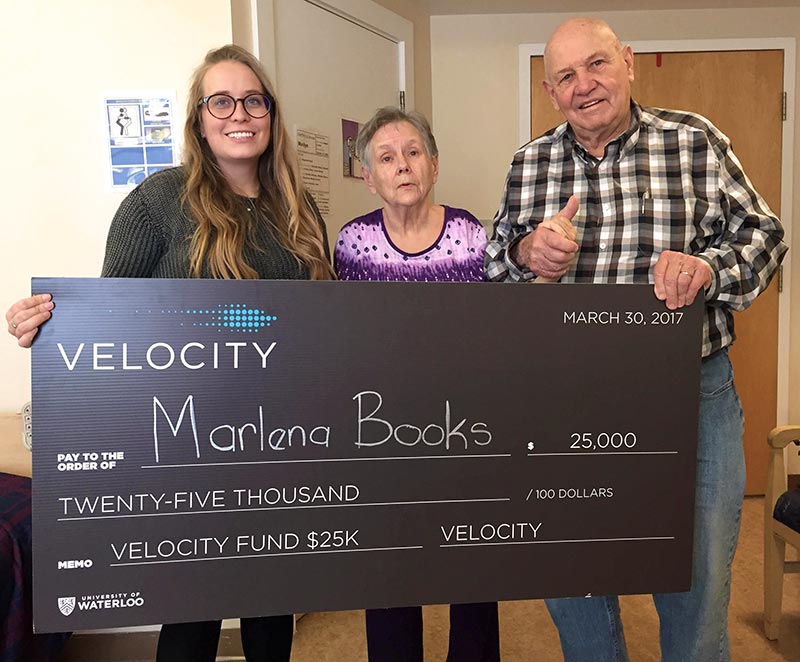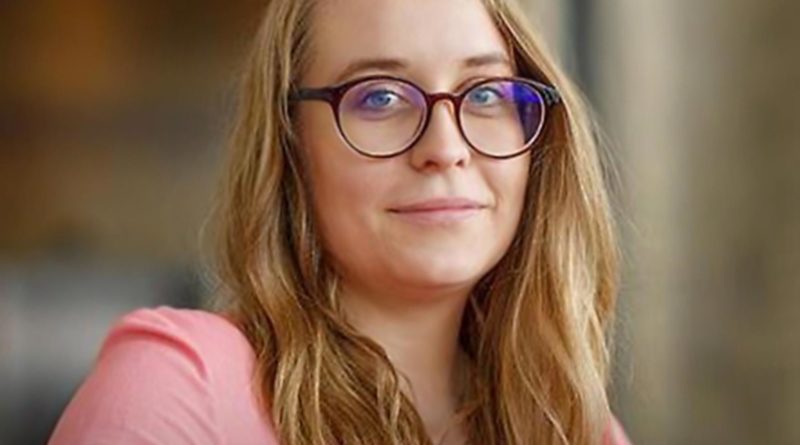Rachel Thompson – Marlena Books
Marilyn was an avid reader.
Every day, she spent some quiet time with a book (often a romance novel), the Bible, or the newspaper.
But 12 years ago, after she was diagnosed with dementia, her collection started to gather dust.
Marilyn is Rachel Thompson’s grandmother. “We noticed as her dementia progressed she wasn’t reading as much, and kind of just thought it was part of the disease,” Rachel says. And as it worsened – “she had forgotten our names, was beginning to forget her husband’s name” – reading was hardly the family’s biggest concern.
That is, until the day her grandmother picked up a newspaper at a family gathering.
“She started reading the headline out loud, word for word, and there were some pretty complicated words,” Rachel says. “We all kind of just sat there, like, ‘You can read?’”
Rachel and her family started hunting for books but came up empty-handed. Novels took too long to read, and her grandmother couldn’t retain information over that length of time.
The only other option was children’s books. That was a problem, too.
“They’re not very dignifying and they’re also not very interesting,” Rachel says. “If you’re 65 or 70, do you want to read the Ugly Duckling?”
Rachel knew she could do better – and that her grandmother deserved better. Now the founder of Marlena Books, she creates books and recreational technology for people living with Alzheimer’s and dementia.
From African hospital to social impact incubator
Rachel was in her final year of health sciences at the University of Waterloo when her grandmother read that newspaper headline.
From that moment, she was determined to learn everything she could about how people living with dementia read, and how reading impacts their memory. She was so determined, she turned it into her senior research project at school.

That research was eye-opening. Through her studies, she learned that the ability to read often sticks around even when we can’t see it from the outside. “Reading is preserved as long as walking and talking in people with dementia, in most cases,” she says.
Reading improves quality of life, too. “It can really change their mood as a whole, so they sleep better, they have less negative behaviours, they’re less stressed,” she says. Plus, it keeps the mind active and helps preserve neural pathways.
But it wasn’t quite a business idea yet.
“We believe that a diagnosis of dementia shouldn’t limit you in any way.”
The final, serendipitous push came when Rachel was walking through UW’s applied health sciences building. She noticed a familiar face on a poster taped to the door she was opening.
That face belonged to Christina Hassan, a student she recognized from a few of her classes.
While the two weren’t close, Rachel knew they shared something in common: both had worked in understaffed and underequipped hospitals in Africa. Christina spent time focusing on maternal mortality in Uganda during a co-op term, while Rachel was often called in to deliver babies at the hospital she worked at in Kenya as part of the University of Waterloo International Health Development Association.
“I really liked how practical her ideas were,” Rachel remembers. “I kind of looked up to her… I really admire her.”
The poster that stopped Rachel in her tracks was from St. Paul’s GreenHouse. It turns out, Christina had been building a company through the social impact incubator, making birth kits for Ugandan hospitals short on supplies.
And the program was looking for new ideas.
“We want to allow people living with dementia to continue living their lives and enjoying the things that they used to enjoy.”
Rachel had never heard of the GreenHouse program before, but inspired by what her classmate had achieved, she made a note in her phone.
It sounded interesting enough to submit an idea of her own: books for people with dementia. “I threw my idea in an online form, went home for Christmas, and didn’t think anything of it,” she says.
Then, in January, she got an email back.
Her idea was accepted.
“I was like, what idea? I had forgotten I had even done it,” she laughs.
The challenge was six weeks long, ending with a pitch competition. The prize was a place at the GreenHouse incubator for the summer. Rachel’s pitch won.

At the end of summer, she won another pitch competition, this time with a cash prize. “It was like, ‘my business has $2,000! We’re going to do all this stuff with it!’ We got another $2,500 from another pitch competition, and it just kept growing. Then we got $20,000, then we got $25,000, then we got $60,000, then we got $75,000,” she says.
“And now we’re all throughout Canada, and selling to the States.”
Specifically designed with care and compassion
Marlena Books started with five stories.
“We have one on hockey, one on building a railroad and some layoffs that come with that, there’s a typical romance story, one about a grandmother and her grandson growing a garden, and then we have a Christmas story,” says Rachel.
In the next batch of stories – there are seven more coming soon – Rachel and her team gathered a few ideas from devoted readers and their families as well.
One of those new topics? Construction. “Because of the boom in aging and in the need for long-term care, many people are living in a construction site,” she says.
Then there’s birdwatching. “A lot of people are at home, looking out the window a lot. They see these different birds, and they’re really interested in learning more.”
For the most part, they’re inspired by her grandmother. “The one about gardening… my grandparents had a garden since the time that they were almost newly married, and maintain still to this day,” she says.

All are quite short, taking 10 to 15 minutes to read. They’re hardcover, with thick pages and large font. Each page is short and sweet, capped at four sentences that make up one full idea, so it’s easier to remember what’s going on (and easier to flip back). They use names instead of pronouns, keep the reading level at around grade five, and most importantly, are about things older adults find interesting.
“We want to allow people living with dementia to continue living their lives and enjoying the things that they used to enjoy,” says Rachel. “We believe that a diagnosis of dementia shouldn’t limit you in any way.”
As for her grandmother Marilyn’s favourite book? “Her dementia is quite progressed. She can no longer really communicate, so she can’t really tell us what she likes the most,” Rachel says, though her grandfather visits twice a day and often reads to her.
“She used to play the piano for a long time,” says Rachel. “She was a big music fan. We don’t have a music book out yet, but it’s coming.
“Maybe she’ll connect best with that one. We’ll see.”
You can find Marlena Books online at

